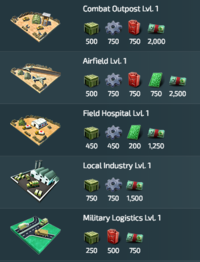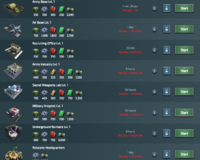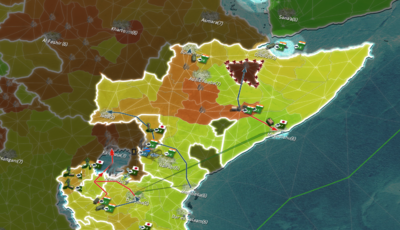Difference between revisions of "Provinces"
From Conflict of Nations Wiki
| Line 17: | Line 17: | ||
<div> | <div> | ||
[[File:BuildingsCity.png|thumb|right|200px|City construction list]] | [[File:BuildingsCity.png|thumb|right|200px|City construction list]] | ||
| − | Cities have the largest strategic value as they are worth a lot of [[ | + | Cities have the largest strategic value as they are worth a lot of [[Victory|Victory Points]], which even increase further as a city's [[#Population|population]] grows. |
<ul> | <ul> | ||
<li> [[#Homeland City|Homeland cities]] and [[#Annexed City|annexed cities]] are also the biggest source for [[Production #Resources|resources]]. | <li> [[#Homeland City|Homeland cities]] and [[#Annexed City|annexed cities]] are also the biggest source for [[Production #Resources|resources]]. | ||
Revision as of 13:23, 5 March 2018
Contents
Provinces
Provinces are the life of your strategic conquest, and will prove to be useful as outposts, airbases, navy bases and more. They have attributes such as Population, Morale, Production, and Terrain Type.
- Capturing and holding a province adds to your total Victory Points. In order to capture a province, your units must occupy the center-point (the point where roads usually form a junction).
- Some provinces contain resources that you harvest by building local industry. These resources spawn randomly when a new game is created.
- Units that are stationed on a province's center-point receive an entrechment bonus that can be further increased through the construction of certain buildings.
- Provinces without cities on their center-point have their own construction list.
Cities
Cities have the largest strategic value as they are worth a lot of Victory Points, which even increase further as a city's population grows.
- Homeland cities and annexed cities are also the biggest source for resources.
- Cities provide a better entrechment bonus to defending troops, compared to normal provinces, and have more buildings in their construction list that further increase it.
Homeland City
Homeland cities are cities that you own at the start of a campaign. These cities have the best starting attributes, with high morale and population, so keep a good eye on them.
Occupied City
In you conquest for global domination, the populus do not appreciate your enforcement into their homeland. Morale is capped and stats are generally low, you will not be able to mobilise units but you are able to construct in the city and use it as a strategic base.
Annexed City
Annexed cities remove the Morale cap of an Occupied City and allow you to start mobilising units. As a result of this increase in Morale, also earns you a higher population rate and better resource gathering.
To Annex a city, select it in your construction list.
Population
Population is a game mechanic which allows for Resources and Victory Points to have higher values. Investment in infrastructure, the construction of bunkers and hospitals, and a clearly visible and supportive military contingent of troops will encourage positive increases in population morale, while wars with multiple nations, poor diplomatic relations, and a lack of basic supplies will have negative effects on your campaign.
WDM contamination
WMD missile attacks will cause contamination on the map area which cause damage to unprotected units and population over time. If a city is contaminated you will need to manually decontaminate it.
Morale
The morale of each province or city is based on several parameters. All of them add or subtract something from the target-morale which is recalculated every day at Day Change. The morale of a province directly affects the production of the resources, units, and buildings of a country. If a province has a very low morale level, it will only produce a small percentage of the optimal amount possible. The most dramatic negative contributor to negative population morale is Insurgencies. In order to counter local population uprisings, leave a unit behind to encourage healthy relations, or inject Gold capital to spur the economy back from the devastation of recent war. When looking for cities low on Morale, remember to make use of the Morale view in the settings to pay attention to provinces which need it.
- Availability of Resources: Citizens need certain goods to be productive and efficient members of society. Players need to make sure to always meet the basic demands of their communities.
- Distance to the Capital: Players can conquer other capitals in order to shorten the paths to border provinces.
- War weariness: Nobody likes war - even when fought for a "just cause". Being at war with too many countries may make citizens lose confidence in their leader.
- Morale of neighbouring provinces: A revolutionist mood can spread across province borders, including those of neighbouring countries.
- Enemy armies: If there are enemy troops on a player’s territory it will cause a negative effect on the people's morale.
Distance to Headquarters
As the capital is significant for the moral of your whole nation, players should always have an eye on the distance to your far-out provinces. To manage a big area as efficient as possible players have to improve provinces with buildings that raise its morale. Conquest of a capital has the following consequences: The country who lost its capital loses 20% morale in all of his provinces and the target-morale decreases by 40%.
Terrain
Each province has a terrain type which can be seen in the Terrain view or Province bar. There are nine types of terrain that will directly influence the movement and combat capacity of your units;
Types of Terrain
- Open ground - A light vegetation which favors mobile warfare. Most units have maximum speed on this kind of terrain
- Mountains- Extremely rugged terrain that causes dramatic effects upon unit movement and unit attrition. Most units, and especially the armored units, have minimum speed on this kind of terrain
- Forest- Medium vegetation that while reducing movement of units also provides defensive options in the form of ample cover.
- Urban- Dense civilian population with tightly constructed buildings. Favors defense and disfavors heavy armor such as tanks. Units are usually very slow in this kind of terrain
- Jungle- Dense and difficult vegetation reduces movement and causes attrition in troops. Favors infantry. Most units, and especially the armored units, have minimal speed on this kind of terrain
- Tundra- Arctic terrain that causes dramatic attrition and disfavors infantry.
- Desert- Arid terrain that causes attrition. Favors mobile warfare.
- High Seas- Open sea marked with large rolling waves.
- Coastal Waters- Coastal waters marked with easily navigable waves.
Terrain Modifiers
- Attack Modification - A unit will be influenced either positively or negatively by this percentage when in this terrain while on attack.
- Defense Modification - A unit will be influenced either positively or negatively by this percentage when in this terrain while in defensive actions.
- Speed Value - A unit will be modified by this percentage as it travels through the defined environment.
- Hit Points - a unit’s Hit Points will be modified depending upon terrain.
- Sight range - The sight at which your unit will be visibly detected varies upon terrain. This is different from radar range, and is shown on the map as the brightest view around your unit
Attrition
Attrition is a mechanism that makes your units lose some HP as they go through some kind of terrain. It’s not severe enough to kill your units, but the Russian Winter or the Sahara Desert will definitely wound your divisions. Beware of Mountains, Jungles, Arctic, and Desert terrain.





